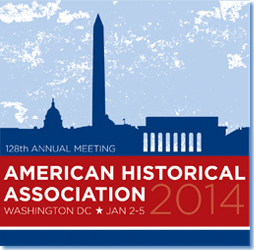This was the first of a two-part session on the future of graduate education. The session focused on the benefits, challenges, and problems posed by “digitally informed dissertations,” and was an excellent opportunity to hear about how digital tools and methods are being applied by some scholars undertaking graduate-level research. The roundtable fostered some very interesting discussion topics that included the use of the web for building a network of interested scholars, the relationship between digital methods and their more traditional counterparts, the benefits and dangers of doing history in an open and public fashion, and the need for better mechanisms for review and evaluation. There was also some discussion of how and when scholars should open up their work to the wider public. 
The panelists were very engaged in the use of digital tools for research and overall very positive about the openness it allows. They all felt this has increased the impact of their work and benefited their careers so far. They were also all very realistic about the risks of taking the kinds of approaches that were being discussed, and measured in their evaluation of the potentials and the pitfalls. Panelists all made it clear that these things were are about individual choice and the direction you want your career to take. One panelist raised the often told story of being warned away from risk-taking in doctoral research, but personally felt that it was a time when the scholar has a lot of enthusiasm could therefore be a fruitful stage for experimentation.
Similar concerns to these have been voiced at many of the digital history panels at the conference and are also the topic of wide-ranging discussion across the discipline. As increasing numbers of historians are doing digital projects both large and small, there is a greater need for understanding the impact of these methods on career paths that are available to the scholar. In order to open up opportunities within the discipline the profession needs better means for evaluating digitally enabled scholarship. To this end, the AHA will soon be announcing a new ad hoc committee on professional evaluation of digital scholarship by historians. This body will be charged with producing a set of guidelines that departments can utilize in the appraisal of digital projects for hiring, promotion, and tenure. Watch our blog and other AHA publications for more on this soon.
This post first appeared on AHA Today.
Tags: AHA Today 2014 Annual Meeting Digital History Graduate Education
Comment
Please read our commenting and letters policy before submitting.






